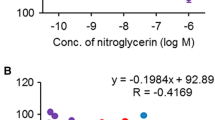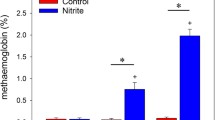Abstract. Global myocardial ischemia and reperfusion injury play a major role in early postoperative myocardial graft dysfunction. The aim of the present study was to investigate the effects of the nitric oxide (NO) precursor l-arginine on myocardial and endothelial function after hypothermic ischemia and reperfusion in a heterotopic rat heart transplantation model. After 1 hour ischemic preservation, reperfusion was started after application of placebo (control,
n = 12) or l-arginine (l-Arg 40 mg/kg, n = 12), a substrate of NO synthesis. Myocardial blood flow (MBF) was assessed by the hydrogen clearance method. An implanted balloon was used to obtain pressure–volume relations of the transplanted heart. Left ventricular developed pressure (LVDP), rate of pressure development (dP/dt), end-diastolic pressure (LVEDP), isovolumic relaxation constant (T E ), and MBF were measured after 60 minutes and 24 hours of reperfusion. Endothelium-dependent vasodilatation in response to acetylcholine (ACh) and endothelium-independent vasodilatation in response to sodium nitroprusside (SNP) were also determined. After 1 hour the MBF was significantly higher in the l-Arg group (3.6 ± 0.6 vs. 1.9 ± 0.2 ml/min/g, p < 0.05). The l-Arg group showed better recovery of systolic function and myocardial relaxation (LVDP 106 ± 6 vs. 70 ± 7 mmHg, p < 0.05; maximal dP/dt 5145 ± 498 vs. 3410 ± 257 mmHg/s, p < 0.05; T E 12.1 ± 0.9 vs. 16.1 ± 1.5 ms, p < 0.05, at an intraventricular volume of 80 μl). LVEDP was similar in the two groups. After 24 hours no difference was found between the groups for basal MBF, LVP, dP/dt, T E , LVEDP, or the response of MBF to SNP. However, ACh led to a significantly higher increase in MBF in the l-Arg group (52 ± 8% vs. 29 ± 7%, p < 0.05). These results indicate that (1) NO donation improves myocardial and endothelial functional recovery during early reperfusion after heart transplantation; and (2) initial treatment with l-Arg has a persisting beneficial effect against reperfusion-induced graft coronary endothelial dysfunction during late reperfusion.
Similar content being viewed by others
Author information
Authors and Affiliations
Rights and permissions
About this article
Cite this article
Szabó, G., Bährle, S., Bátkai, S. et al. l-Arginine: Effect on Reperfusion Injury after Heart Transplantation. World J. Surg. 22, 791–798 (1998). https://doi.org/10.1007/s002689900471
Issue Date:
DOI: https://doi.org/10.1007/s002689900471




